Choosing a Healthy Pet Food
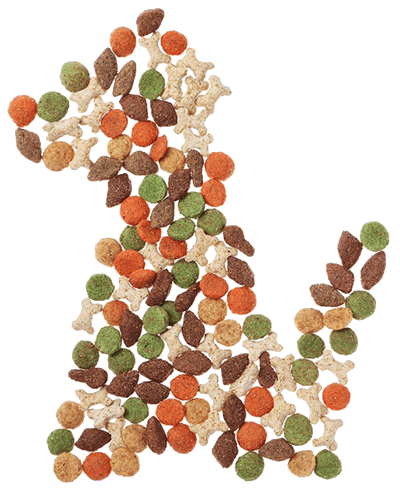 Navigating the seemingly endless choices of pet foods can be very daunting at best. But fear not! With these helpful tips, you will be able to quickly cross off your list many undesirables, and cut through the marketing hype to make the best possible purchasing choice you can.
Navigating the seemingly endless choices of pet foods can be very daunting at best. But fear not! With these helpful tips, you will be able to quickly cross off your list many undesirables, and cut through the marketing hype to make the best possible purchasing choice you can.
The Pet Food Industry - A Quick Glance
Pet food is a $1.6 billion/yr. industry, and the major pet food companies in the US are subsidiaries of gigantic multinational food corporations. In reality, there are only a few big players in the pet food business:
| Nestle's |
|
Del Monte |
|
MasterFoods |
|
Proctor & Gamble |
|
Colgate-
Palmolive |
Fancy Feast
Alpo
Friskies
Mighty Dog
Beneful One
ProPlan
DeliCat
HiPro
Kit’n’Kaboodle
Tender Vittles
Purina Veterinary Diets |
|
MeowMix
Gravy Train
Kibbles ’n Bits
Wagwells 9Lives
Cycle Skippy
Nature’s Recipe
Milk Bone
Pup-Peroni
Snausages
Pounce |
|
Royal Canin Pedigree
Waltham’s
Cesar
Sheba
Temptations
Goodlife Recipe
Sensible Choice
Excel |
|
Iams
Eukanuba |
|
Hill’s Science Diet
Prescription Diets
Nature’s Best |
|
This is by no means a complete list of pet food manufacturers:
- International Companies
There are several large international players such as Champion Petfoods (a Canadian manufacturer who owns the Acana and Orijen brands).
- Private Labelers
There are 3 main private labelers who produce dozens of private label pet food brands for companies such as WalMart (Ol' Roy) and Kroger/Ralph's/Fred Meyer/QFC (President's choice).
- Smaller Manufacturers
Aside from the big players, there are a countless number of smaller pet food manufacturers, some of which are available nationally, and some only in their local geographical area.
Many commercialized pet foods have become the subject of serious pet food recalls, especially dried kibble. All 3 private label companies have been involved in pet food recalls that caused the sickness and/or death of many pets (which included Ol' Roy and President's Choice, among many others).(1)
When choosing any pet food brand, look to see if there has been any pet food recalls, and understand the nature of the recall to best determine if the food should be avoided.
Learn about pet food recalls...
8 Important Tips On Choosing Healthy Pet Foods
Let's take a look at the 8 tips that can help ensure you are making the best possible food choice for your furry friend:
#1 - Read the packaging & ingredients list... carefully!
Commercial pet food is typically highly processed with fillers, by-products, and artificial lab-made flavoring and coloring. In general, the very cheapest foods can be counted on to have the very cheapest ingredients (although to add insult to injury, some expensive "veterinary diets" are the worst offenders).
How do you know if the ingredients are healthy? The same way you know if ingredients in human food are healthy - they should be food ingredients you recognize (such as beef, or chicken, or duck) rather than a list of chemicals that are not food, and food items that are not appropriate for pets.
Look carefully at the packaging and ingredient list. Federal law requires manufacturers to list ingredients in the order of their pre-cooked weights. This means that the first ingredient is the one in the largest quantity, followed by the second ingredient. But beware of a sneaky practice called "ingredient splitting" (see below).
Look for:
- The first few ingredients listed are the most important as they comprise most of the content in the food. Meat and/or fish should ALWAYS be listed as the first 2-3 ingredients. Look for whole meats or fish such as "lamb" or "chicken" or "duck" or "beef" or "turkey" or "salmon."
- Look for animal organs such as "turkey heart" or "chicken liver." These are highly nutritious and provide important nutrients.
- Whole meats may be followed by specific meat "meals" such as "lamb meal" or "chicken meal" - because these are highly processed, they should not be listed as one of the first few main ingredients.
- The next ingredients should be from whole vegetables and fruits.
- Any added vitamins or minerals should be towards the end of the list, and should be naturally sourced and not synthetic (see below).
Walk away from:
- Ingredients containing corn or soy - there is nothing healthy about processed and refined soy products for humans or pets.
- Ingredients containing sweeteners. There is no reason for it! Sweeteners, if used, should only be in treats and should be:
1) Close to or at the bottom of the ingredient list, and
2) From natural sugars/fruits such as apples, apple sauce, molasses, or honey
- Food containing by-products (slaughterhouse waste). Although some by-products are healthy, most or not. By-products can contain beaks, feathers, feet, hooves, hair, and even growths and tumors that have been ground into the mix (these are perfectly legal pet food ingredients by FDA standards).
- Foods containing artificial coloring: There is never a good reason to use artificial colors in pet (or human) foods. Your pet does not care about the color of their food!
- Foods containing artificial flavoring. Each artificial flavoring is comprised of dozens of chemicals to "create" the flavor intended. The term "chicken flavor" may not contain any chicken ingredient whatsoever, but instead, up to 50 different chemicals. There should never be a reason to add artificial flavoring. ...Read more about chemicals in food.
- In general, avoid foods that state the word "animal" or "poultry" but do not mention which specific animal species, e.g. the generic "animal fat" as opposed to "chicken fat" or "duck fat."
Look for natural preservatives:
Only natural preservatives should be used in your pet's food. The shelf life may be shorter (less than 6 months), but do you really want to be feeding your pet any food that is over 6 months old? Many commercial pet foods contain chemical preservatives so that they remain edible for very long periods of time (1 year, on average). Some of these ingredients are toxic and really have no place in the human or pet food chain:
Natural preservatives include:
-
- Vitamin C (ascorbate).
- Vitamin E (mixed tocopherols).
- Oils of rosemary, clove, or other spices.
- Lemon juice
Artificial preservatives include:
-
- Butylated hydroxyanisole (BHA), a potential cancer-causing agent.
- Butylated hydroxytoluene (BHT), a potential cancer-causing agent.
- Ethoxyquin, a potential cancer-causing agent manufactured by Monsanto - see below.
- Propyl gallate.
- Potassium sorbate.
- Propylene glycol, a type of auto anti-freeze used to keep food moist and chewy, and to prevent food discoloration. Banned in cat food as it causes anemia, but still present in dog food.
- Sodium nitrate, used as both a food preservative and coloring.
- Calcium propionate.
There are no long-term studies on the toxicity or safety of using these artificial ingredients in food products.
Ethoxyquin
This toxic ingredient is often used as a preservative in fish ingredients in the US. Some pet food critics and veterinarians believe that ethoxyquin is a major cause of disease, skin problems, and infertility in dogs. Others disagree. Ethoxyquin has never been tested for safety in cats. Some of the major pet food manufacturers, including Hill's, Iams, and Purina, continue to use ethoxyquin in some of their products. They even include it in their expensive "veterinary food" lines such as Iams Veterinary Formulas.
#2 - Beware of "Ingredient-splitting"
The first ingredient sometimes IS NOT the ingredient of the highest quantity, even though it is legally required to be. How is that possible? Because of a deceptive practice called "ingredient-splitting."
One of the biggest dirty secrets behind not sharing the amount or percentage of ingredients is known as ingredient-splitting. This is where instead of listing one food as 100%, the manufacturer will split it up and list it as several different foods. This artificially moves less desirable ingredients lower on the ingredient list and gives the illusion to the consumer there is less of it. This means that even when meat is listed as the first ingredient, it may not actually BE the ingredient in the largest quantity.
Take a look at 2 different examples where ingredient-splitting was used to falsely represent the quantity of meat:
| Misrepresenting Rice |
|
Misrepresenting Corn |
Actual Amounts
Rice - 31%
Chicken - 20%
Reported Amounts
- Chicken (20%)
- Brown rice (11%)
- White rice (8%)
- Rice bran (8%)
- Rice gluten meal (4%)
Chicken is now the first ingredient on the list. |
|
Actual Amounts
Corn 30%
Lamb 18%
Reported Amounts
- Lamb (18%)
- Corn flour (15%)
- Corn meal (15%)
Lamb is now the first ingredient on the list. |
|
|
|
Most pet food manufacturers make it very difficult for pet owners to make a more educated decision about ingredient quantity by not sharing the amount or percentage of each food. Reputable pet food manufacturers who have little to hide freely choose to list this information on their packaging.
Look for pet foods that list
AMOUNTS or PERCENTAGES of their main ingredients.
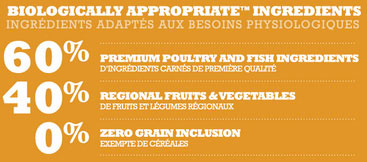
#3 - Make sure it meets AAFCO specifications
The
Association of American Feed Control Officials (AAFCO) is a non-profit voluntary membership association created to protect consumers, and to safeguard the health of animals and pets. It does this by setting standards for pet foods, animal feeds, and animal drug remedies for sale and distribution in the US.
These nutritional standards decide whether a food is complete and balanced (based on their own definition of complete and balanced) during the following life stages:
- Puppyhood / Pregnancy
- Adulthood
In order for a pet food manufacturer to meet one of these two AAFCO nutritional standards, it must be validated via laboratory analysis. After validation, the manufacturer may then legally state that it is AAFCO compliant on their food packaging.
Keep the following facts in mind with regard to this certification:
- Pet food manufactures are under no obligation to meet AAFCO standards, but if they do not, their product must state: "This product is intended for intermittent or supplemental feeding only,” meaning that it is not intended for long-term feeding.
- AAFCO does not concern itself with the amount of any ingredient present. The levels of some very important nutrients are completely left to the discretion of the pet food manufacturer.
- AAFCO has no regulatory authority, and the standards they develop are not law. But their stamp of approval on pet products does indicate minimum standards have been met (minimum based on a general guideline). It provides a model that is followed by many US pet food manufacturers.
AAFCO-Certified IS A Good Start, But Not Enough
Ensuring the pet food you choose is AAFCO-approved is a great place to begin, but it is only a basic starting point. We need to aim beyond "minimum standards," especially when we consider that the abysmal "acceptable standards" of human food directly contribute to four of the biggest killers: Heart disease, obesity, diabetes, and cancer.
#4 - Don't be fooled by flashy words & pretty pictures
Never blindly trust slogans and pretty pictures plastered on pet food packaging. Trust ONLY the ingredient label, which is the government-regulated portion of the label. The rest is all fair game when it comes to advertising and marketing.
Don't Trust "Natural"
Many words such as "natural" and "premium" and "gourmet" are used by both pet and human food manufacturers who have spent millions of advertising dollars to capitalize on the power of persuasive advertising. And it works! How many of us have found it difficult to resist the alluring pictures and words. Most of these foods are far from natural.
When it comes to pet and human foods, the word "natural" has very little official meaning. Lax labeling laws means that food manufacturers can unscrupulously say their products are natural when they are anything but. In fact, it's anyone's guess these days what the word translates to on a food label. If a food is endorsed by AAFCO, then the term "natural" only means "to lack of artificial flavors, artificial colors, or artificial preservatives in the product." Many other artificially processed ingredients and chemicals can and often are present.
Just Because It's Natural Doesn't Mean It's Appropriate
Also remember that just because a food is a whole food or "healthy ingredient" does not mean it is healthy for your pet. Barley, beets, peanut butter, molasses… lovely for humans, but not so natural in the daily diet for our furry friends.
#5 - Avoid products sourced or packaged in China
"Contaminated jerky is responsible for thousands of illnesses, and hundreds of deaths suffered by pets throughout the US."
|
The words "Made in China" are often hidden in tiny words somewhere on the food or treat label, usually right at the bottom in the corner. It is very important to avoid ALL pet food, treats, and especially jerky treats from China. Avoid ANY pet food that is either manufactured in China, or lists any ingredients sourced from China. The scandals and recalls resulting from contaminated Chinese products speak for themselves.
The Melamine Wake-up Call
The biggest pet food recall in history, which caused thousands of pets to become sick and die of kidney disease, was the result of melamine-tainted foods from China. The melamine was also fed to livestock in the American food chain, and used in powdered infant milk formulas in China. The tragic result was that infants suffered 294,000 kidney-related illnesses, including 6 deaths. Melamine went on to be an ingredient used in thousands of products all over Asia, leading to kidney stones, urinary tract ulcers, skin, and eye irritations.
Contaminated Jerky
As of September 24, 2013, our government has received approximately 3,000 reports of pet illnesses that may be related to the consumption of jerky treats, most sourced from China. The reports involve more than 3,600 dogs, 10 cats, and more than 580 deaths. Avoid all jerky treats unless you can be sure they are from the USA (or better yet, locally sourced). Consider making your own pet treats with our home-baked doggy treat recipes.
According to a study by the Democrats on the House Appropriations Committee, FDA inspections of all imported food products are a mere 2.3%. In 2011, more than half of food processing and packaging firms in China failed safety inspections, according to a report by Asia Inspection, a China-based food quality control company who calls this figure "alarming." More disturbing is that rodent fecal contamination was responsible for around 10% of this figure.
Instead of using the common-sense approach of inspecting all imported food from China due to the high risk of contamination, the USDA is allowing US food retailers to import even more food from China. As we have seen, attitudes like this contribute to the globalization of a sickening food supply.
Avoiding Ingredients From China
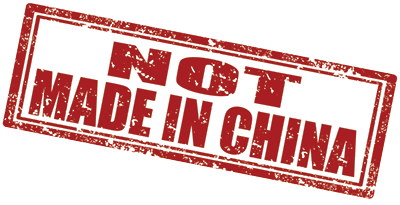
Due to practically non-existent origin labeling laws, companies are not required to label where ingredients come from, only where the food was packaged or processed. A pet food may contain 25 ingredients from 25 different countries, with the FDA only inspecting a fraction of incoming foods. This can make it difficult to make an informed decision.
Avoiding ingredients from China may sound easy, but in reality, it can be very tricky. Many basic pet and human food ingredients come from China, including supplements and over-the-counter pain medications (90% of the US supply of vitamin C comes from China).
- Look for pet food manufacturers who are completely transparent about where ALL of their ingredients are both sourced and manufactured. A reputable brand will clearly state where their ingredients come from and where they are prepared. Companies such as Champion (Acana & Orijen), Lotus Pet Foods, PetGuard, and Nature's Variety (except for rabbit) are examples of companies who do not source any ingredients from China.
- Check out locally prepared pet foods. Many smaller pet food manufacturers use locally sourced ingredients that are fresher, so visit your local pet food store and check to see if there are any local pet food manufacturers.
- Consider a home-cooked pet diet where you are in control of all the ingredients and where they come from. ...Read more
- Bake your own cookies and treats. ...Read more
#6 - Check out pet food reviews
Check out the reviews of various pet food brands by both independent agencies and pet owners. Our favorite resources are:
#7 - Animal testing
"The USDA investigated & found a facility used by Iams to be guilty of nearly 40 violations of the Federal Animal Welfare Act."
|
Public video tapes have shown animals used in pet food testing facilities to be the victim of heartbreaking and completely unnecessary cruelty, invasive and dangerous experiments, and forced to live in barren metal cages. Large colonies of dogs and cats are kept for the purpose of these tests in the name of "taste testing" and other forms of testing.
Working undercover, animal welfare investigators have made tragic discoveries at some of the biggest food manufacturers and the testing facilities they use.
Shame On Iams
Over a 10-month period, a PETA investigator worked undercover at Sinclair Research Center, a laboratory used by Iams where dogs were confined to barren steel cages and cement cells. They were left piled on a filthy paint-chipped floor after chunks of muscle had been hacked from their thighs. Dogs were surgically debarked, and extremely sick dogs and cats were neglected and left in cages to suffer without any veterinary care. The USDA investigated and found the facility guilty of nearly 40 violations of the Federal Animal Welfare Act.
Disturbingly, only under intense pressure did Iams finally agree to make significant changes in its testing program. The lack of humility and respect for the animal world they claim to serve was unconscionable. Their actions have caused many to no longer purchase any Iams food or treat products, and sparked the website Iams Cruelty.
If you use an Iams brand pet food, please reconsider your choice in favor of a manufacturer that does not condone this type of cruelty.
|
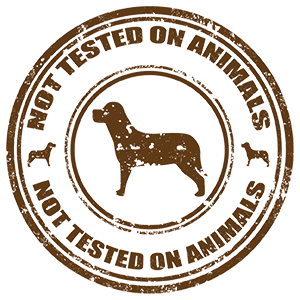 Many companies do not engage in animal testing, or if they do, it is only under conditions that are considered humane and where the quality of life is preserved and no dangerous chemicals are used. Some of these animals are owned by the general public. The testing is truly for "taste" and not to test the effects of dangerous chemicals that should not be present to begin with.
Many companies do not engage in animal testing, or if they do, it is only under conditions that are considered humane and where the quality of life is preserved and no dangerous chemicals are used. Some of these animals are owned by the general public. The testing is truly for "taste" and not to test the effects of dangerous chemicals that should not be present to begin with.
When making purchasing choices for pet foods, please consider choosing only those companies who do not engage in cruel animal testing.
#8 - Call the manufacturer if you have questions

Some pet food manufacturers are very forthcoming about their products and are more than willing to provide you with detailed information on their ingredients, and how they process and prepare the pet foods they offer. Some are not.
Do not hesitate to ask for clarification on anything that sounds confusing, and ask all the questions you need to. If you do not like the answers, move on.
Important Things to Be Aware Of
By-Products & 4D Animals
The term "4D animals" refers to animals that are (D)ead, (D)iseased, (D)ying, or (D)isabled that have been banned for human consumption, but are a convenient way for the agricultural industry to use them legally in pet foods. This is because the FDA considers them "legitimate" food items. Slaughterhouse waste includes intestines, udders, heads, hooves, ligaments, fat trimmings, lungs, feathers, and sometimes diseased and cancerous animal parts. Some by-products are nutritious, while some should never been part of either the human or animal food chain. If you are surprised there are no laws or regulations preventing 4D use, don't be.
FDA failure to protect human & pet food...
Better brands of pet foods do not use by-products, which is why they are often more expensive. Low quality food is cheap, although there are now several very expensive dog foods (including "veterinary diets") filled with absolutely terrible ingredients that should never be fed to pets. If you don't believe it, take a peek at their ingredient lists and see just how bad they are.
Recalled, Expired, Diseased, & Contaminated Items
Yes, it is true, even though the thought of it may turn your stomach. The public is generally unaware that the FDA allows the following items to be legally used in pet foods:
- Recalled foods
- Expired foods
- Meat from diseased animals
- Foods contaminated with bird, rodent, or roach excrement
Read the disturbing FDA policies on pet foods...
|
CPG Sec. 675.100 Diversion of Contaminated Food for Animal Use
“FDA does not object to the diversion to animal feed of human food adulterated with rodent, roach, or bird excreta.”
CPG Sec. 690.300 Canned Pet Food
“Pet food consisting of material from diseased animals or animals which have died otherwise than by slaughter, which is in violation of 402(a)(5) will not ordinarily be actionable, if it is not otherwise in violation of the law. It will be considered fit for animal consumption.”
CPG Sec. 675.400 Rendered Animal Feed Ingredients
“No regulatory action will be considered for animal feed ingredients resulting from the ordinary rendering process of industry, including those using animals which have died otherwise than by slaughter, provided they are not otherwise in violation of the law. Compliance Policy Guide 7126.08 recognizes the AAFCO definitions as generally constituting the common or usual names for animal feed ingredients conforming in origin and content to these definitions. Included are such products as poultry by-product meal, meat meal, meat and bone meal and fish meal.” |
Canned vs. Dried
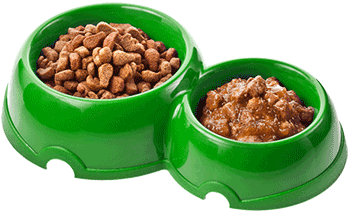 Dried kibble is much more popular than wet food, simply because it is cheaper to buy and more convenient to use (especially when taking road trips or vacations). Wet food contains water and is heavier than dried food, which makes it more expensive to ship. Depending on the ingredients and how they are processed, one is not necessarily better than the other.
Dried kibble is much more popular than wet food, simply because it is cheaper to buy and more convenient to use (especially when taking road trips or vacations). Wet food contains water and is heavier than dried food, which makes it more expensive to ship. Depending on the ingredients and how they are processed, one is not necessarily better than the other.
A popular argument for dried kibble is that wet food contributes to plaque build-up and more dental problems. But the quality of the dog food is much more important when it comes to dental health. Carbohydrates are a main source of dental plaque accumulation on our pet's teeth, present in both types of food in varying quantities. Wet food is not crunchy and cannot help scrape a dog's teeth, but any healthy pet diet should include appropriately sized fresh, raw bones when supervised which addresses this issue.
Why bones are so important  Pet dental care
Pet dental care
The Word "Meal"
The term “meal” means that the ingredient has been rendered (heavily processed for industrial use). During rendering, raw materials are boiled in a vat for several hours. This separates fat, removes water, and kills viruses, bacteria, and parasites. The high temperatures used in boiling also destroy many of the nutrients and food enzymes, and denature the protein in the food.
RELATED ARTICLES
In this section...
In other pet sections...
View Sources & References
 Navigating the seemingly endless choices of pet foods can be very daunting at best. But fear not! With these helpful tips, you will be able to quickly cross off your list many undesirables, and cut through the marketing hype to make the best possible purchasing choice you can.
Navigating the seemingly endless choices of pet foods can be very daunting at best. But fear not! With these helpful tips, you will be able to quickly cross off your list many undesirables, and cut through the marketing hype to make the best possible purchasing choice you can. Dried kibble is much more popular than wet food, simply because it is cheaper to buy and more convenient to use (especially when taking road trips or vacations). Wet food contains water and is heavier than dried food, which makes it more expensive to ship. Depending on the ingredients and how they are processed, one is not necessarily better than the other.
Dried kibble is much more popular than wet food, simply because it is cheaper to buy and more convenient to use (especially when taking road trips or vacations). Wet food contains water and is heavier than dried food, which makes it more expensive to ship. Depending on the ingredients and how they are processed, one is not necessarily better than the other. ![]() Pet dental care
Pet dental care





 Many companies do not engage in animal testing, or if they do, it is only under conditions that are considered humane and where the quality of life is preserved and no dangerous chemicals are used. Some of these animals are owned by the general public. The testing is truly for "taste" and not to test the effects of dangerous chemicals that should not be present to begin with.
Many companies do not engage in animal testing, or if they do, it is only under conditions that are considered humane and where the quality of life is preserved and no dangerous chemicals are used. Some of these animals are owned by the general public. The testing is truly for "taste" and not to test the effects of dangerous chemicals that should not be present to begin with.